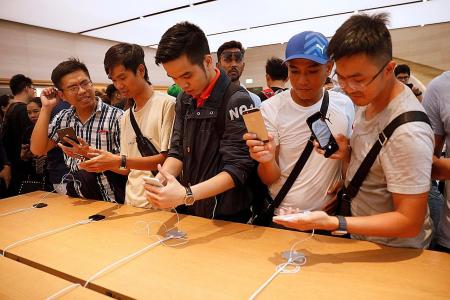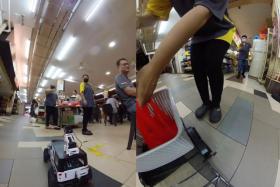Let's get smart about smartphones
We should not let technology take away empathy or social awareness
Recently, my phone was faulty and I had to live without it for several days.
The experience was awkward, yet liberating in a way, and made me reflect on the topic of modern technology.
The progress of modern technology over the past two decades has been phenomenal, leading to massive changes in the way we live - some more beneficial than others.
While technology helps us become more efficient and effective, there are also ramifications that have tempered its advantages.
In particular, smartphones and social media have revolutionised the way we communicate and organise our lives, but it has also led to some disturbing trends such as narcissistic tendencies and rising social awkwardness.
Rising affluence in our society has led to many, including young children, owning the latest smartphone, notepad or some other latest technological device.
Those who do not have something similar often feel left out, or worse, ridiculed.
On social media, people also frequently post or upload content of themselves or their latest purchases, especially if it involves some bragging rights.
There is more narcissism, in which the person who posts hopes to garner as many 'likes' as possible.
We must be careful not to let technology become a social barometer.
Educating the young on the proper use of technology is imperative.
It is necessary, even more so now, to inculcate in children the need to be sensitive to others who may not be as fortunate as them - accentuating the value of empathy is important.
EXPRESS THEMSELVES
Many people, especially the young, also use social media as a vehicle to express their emotions.
This in itself is not bad, but it can be a problem in certain circumstances.
When posting comments on social media, it is much easier to criticise others with the distance and anonymity of the internet.
But such aspersions cast can affect a person's self-esteem and can have insidious psychological effects on individuals.
Taken to extremes, it becomes cyberbullying.
The usage of social networking sites has also led to an uptick in virulent criticism, which occurs when people have strong feelings about a subject.
This is because people tend to believe what others share on social media without trying to ascertain its veracity.
Technological devices like smartphones also reduce face-to-face interaction and the ability to understand and elicit emotions without seeing each other.
A research study in the US found that students who spend excessive time on smartphones are less able to detect human emotions.
At the same time, quality face-to-face-relationships have increasingly yielded to more impersonal relationships over smartphones and related apps.
While social networking sites can augment our social life, face-to-face relationships with friends are irreplaceable.
Emotions like joy, remorse and sadness are best experienced with one's friends and not experienced superficially from "behind the screen".
Smartphones help us to organise our lives. It is our calendar, alarm clock, Internet search engine, e-mail browser and leisure partner.
Smartphones have become something that we cannot live without.
Yet, there are drawbacks.
Health-wise, research has suggested that excessive use of smartphones can damage eyesight and affect sleep and mental health, due to the blue light that smartphones emit.
Those addicted to their smartphone will always seem to be busy and unable to find time for reflection in their lives.
Research has shown that this reflection is necessary to foster creativity; while excessive busyness stifles it.
A Scientific American article and various studies found that downtime - relaxation time and moments of respite in daily life - helps boost concentration, achieve higher levels of productivity and foster creativity.
Many find living in Singapore increasingly stressful,possibly precipitating mental health issues like anxiety and depression.
The smartphone is partly to blame for this malaise.
Singapore's plan to transform into a "smart nation" attests to our embrace of technology.
But the onus is on us to use such technology appropriately and not let it dominate our lives.
The writer is a freelance writer in Singapore. He is interested in reading, writing and travelling.
Get The New Paper on your phone with the free TNP app. Download from the Apple App Store or Google Play Store now



